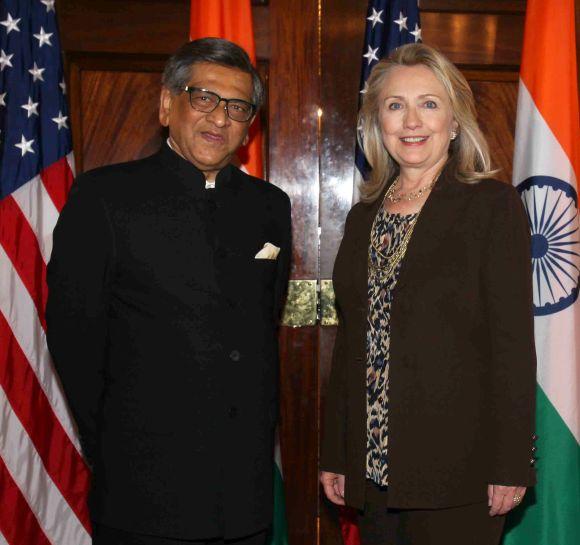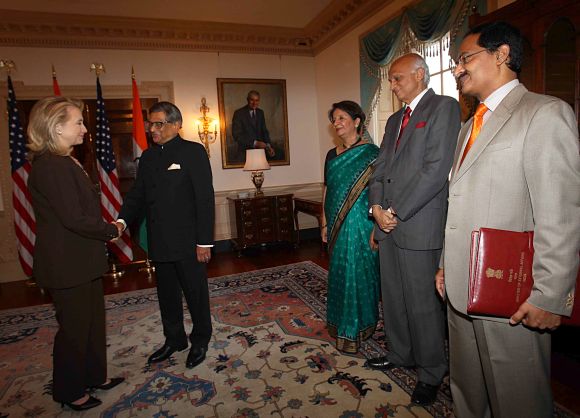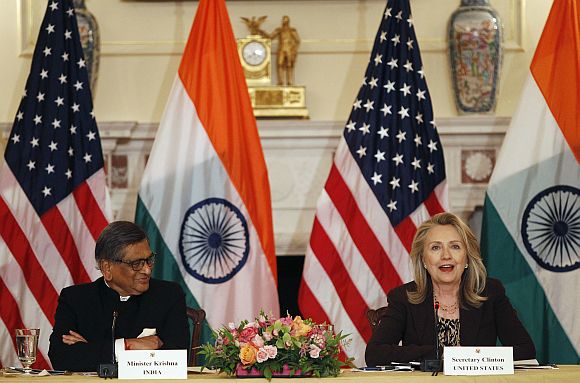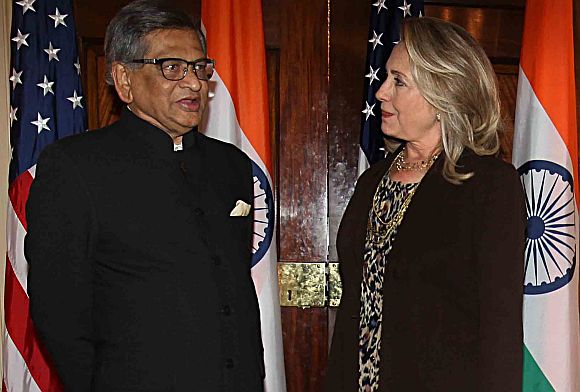 | « Back to article | Print this article |
India, US forging a new, mature phase of ties: Clinton
Focusing on five key areas including security cooperation and trade, United States Secretary of State Hillary Clinton on Wednesday said India and the United States are moving to forge a new and more mature phase of ties, as the 3rd Indo-US strategic dialogue kicked off in Washington, DC.
"The strategic fundamentals of our relationship, shared democratic values, economic imperatives and diplomatic priorities, are moving us closer to an understanding and a trust that reflects the convergence of values and interests," Clinton said in her remarks to the dialogue.
To grow and prosper, we both need open, free, fair and transparent global economic systems; the two countries seek security and stability in South Asia and the Asia-Pacific; and understand the critical importance of a coordinated international response to violent extremism and other shared global challenges, she said kicking off the meeting, which she co-chaired with the External Affairs Minister S M Krishna.
"As a result, under President Obama's and Prime Minister Singh's leadership, we are forging a new and more mature phase in our critical bilateral relationship, one defined by near-constant consultation aimed at advancing the interests and values we share and working through the inevitable differences," Clinton said.
"There is less need today for the dramatic breakthroughs that marked earlier phases, but more need for steady, focused cooperation," she said adding that this kind of weekly, sometimes daily collaboration is not always glamorous, but it is strategically significant and it is exemplified by this dialogue.
Please click NEXT to read further...
'Bilateral trade, investment may exceed $100 bn this year'
India and the United States, she said committed to not only expanding their bilateral relationship, but to furthering the work we do regionally and globally.
In fact, later this week the two countries co-hosts an important global health conference on child mortality, she noted.
Clinton said the effectiveness of India-US partnership hinges on their ability together to convert common interests into common actions.
"It's not enough just to talk about cooperation on issues ranging from civilian nuclear energy or attracting more US investments to India or defending human rights or promoting women's empowerment.
"We have to follow through so that our people -- citizens of two great, pluralistic democracies -- can see and feel the benefits," she said.
Noting that bilateral trade and investment may exceed $100 billion this year, up ten fold since 1995 and up more than 40 per cent since 2009, when the strategic dialogue was launched, she felt that there is a lot of room for further growth, and we need to keep up the momentum.
"We look forward to working to advance negotiations on the bilateral investment treaty, to further reduce barriers to trade and investment in areas like multi-brand retail, and to create hospitable environments for each of our companies to do business in the other's country," Clinton said.
Observing that the bilateral defence trade has surpassed $8 billion over the last five years, Clinton said: "We are convinced this partnership can grow in the future to include joint research, development and co-production of defense systems".
'Sometimes there are questions and doubts about the relationship'
In the discussions on, she hoped that the two nations can focus in particular on the need to deepen cooperation on cyber security, which is a growing concern for both.
The five areas of focus she mentioned was trade and investment, science and technology, education and people-to-people ties, security and defense cooperation, and cooperation in South and East Asia.
As the India and US deepen and strengthen their bilateral relationship at an unprecedented pace, questions and doubts of this "new and unique" relationship are inevitable, Krishna said.
"Sometimes there are questions and doubts about the relationship. They are inevitable in something so unique and new. But I believe that having settled the question of whether India and the US can or should work towards a close relationship, the questions we ask now are how to harness the full potential of that relationship," Krishna said.
India-US bilateral engagement as well as global developments over the past three years has only strengthened the mutual commitment to this partnership, he said in his address to dialogue.
In every field -- political, strategic, security, defence, intelligence, nuclear cooperation, space, trade and investment, energy, science and technology, higher education and empowerment -- the two countries are making tangible and continuous progress.
"What was once normal and unprecedented in our relationship is now almost routine and novel. In the process of our engagement, we have built something more precious -- friendship, good will, trust, mutual confidence, candour, and belief in the importance of a successful partnership," he said.
'Unprecedented intensity of engagement'
Krishna is leading a high-powered Indian delegation to the US to attend the strategic dialogue.
Among other representing the Indian side were Ghulam Nabi Azad, minister for health and family welfare; Montek Ahluwalia, deputy chairman, planning commission; Krishna Tirath, minister of state for women and child development; Ashwani Kumar, minister of state for planning, science and technology and earth sciences; and Sam Pitroda, public information, infrastructure and innovation adviser to the prime minister.
Foreign Secretary Ranjan Mathai and ambassador to the US Nirupama Rao were also present on the occasion.
"Even by the high standards of India-US relationship, we have had an unprecedented intensity of engagement for the past years.
"Yet the strategic dialogue is a unique opportunity to bring together all the threads of our cooperation that constitute the extraordinarily rich tapestry of our relationship," Krishna said.
"Our two sides have a shared vision that our global strategic partnership could be one of the most important or defining relationships of the 21st century.
"In July 2009 in Delhi, we started a new chapter in an already exciting study of India-US ties," he said.
Krishna added bilateral engagement as well as global developments over the past three years has only strengthened both countries' mutual commitment to this partnership.
TOP photo features of the week
Click on MORE to see another set of PHOTO features...




